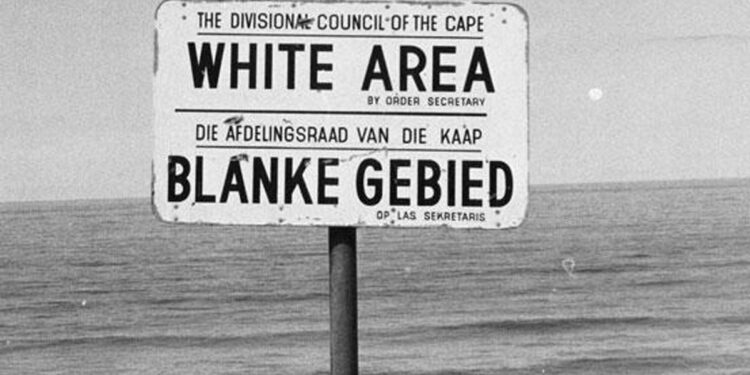Unraveling the Complex Bond Between American Conservatism and South African Apartheid
In recent decades, the legacy of apartheid has reemerged as a pivotal topic in conversations about social justice and political ideology. Particularly compelling is the intricate relationship between segments of American conservatism and South Africa’s apartheid regime—a connection that shaped international responses during the late 20th century and continues to influence political narratives today. This exploration sheds light on how anti-communist sentiments and economic interests forged unexpected alliances, revealing enduring impacts on contemporary U.S. politics.
Tracing Historical Connections: American Right-Wing Support for Apartheid
The alliance between certain factions within American conservative circles and South Africa’s apartheid government was rooted in shared ideological commitments, especially during the Cold War era. At a time when global tensions centered around combating communism, many right-wing leaders in the United States viewed apartheid not only as a domestic policy but also as a strategic bulwark against Soviet influence in Southern Africa.
Key political figures—including influential members of Congress—advocated for maintaining ties with Pretoria, emphasizing free-market capitalism as an antidote to communist expansion. This support manifested through various channels: financial aid funneled to pro-apartheid organizations, public endorsements by conservative politicians, and collaborative forums celebrating what they perceived as Western democratic values upheld by South Africa’s regime.
This historical partnership was far from monolithic; it coexisted alongside vigorous opposition from global anti-apartheid activists who condemned racial segregation unequivocally. Yet understanding this complex dynamic is essential for grasping how geopolitical strategy often overshadowed human rights concerns during that period.
The Enduring Influence of Right-Wing Ideologies on Race Discourse Today
The echoes of this Cold War-era alignment resonate within modern right-wing rhetoric surrounding race relations in America. The framing once used to justify support for apartheid—as a necessary stand against leftist ideologies—has evolved into contemporary debates over immigration policies, multiculturalism, and national identity.
- Political Advocacy: Some conservative leaders continue to invoke themes reminiscent of past alliances by emphasizing law-and-order narratives tied closely with cultural preservation.
- Financial Networks: Funding streams supporting nationalist movements today mirror earlier patterns where resources were directed toward groups promoting exclusionary policies.
- Mainstream Media Framing: Selective media portrayals often downplay systemic inequalities while amplifying fears about demographic changes—paralleling tactics used during apartheid-era propaganda campaigns.
This persistent ideological thread contributes to polarized public discourse marked by heightened racial tensions intertwined with economic anxieties—a phenomenon reflected globally amid rising populist movements. For instance, recent studies indicate that nearly 45% of Americans perceive immigration as detrimental to national cohesion (Pew Research Center, 2023), underscoring how these historical legacies shape present-day attitudes.
A Comparative Analysis: Past Alliances Versus Present Political Realities
| Dimension | Apartheid Era Dynamics | Contemporary Parallels |
|---|---|---|
| Economic Motivations | Sustained support driven by access to mineral wealth like gold and diamonds; | Ties maintained through trade agreements with authoritarian regimes prioritizing resource extraction; |
| IDeological Foundations | An unwavering commitment to anti-communism uniting disparate actors; | The rise of populist nationalism emphasizing sovereignty over global cooperation; |
| Civil Rights Considerations | Dissent suppressed or marginalized amid geopolitical priorities; | Civic activism faces increasing resistance amid legislative rollbacks targeting minority communities; |
This juxtaposition highlights recurring themes where strategic interests frequently eclipse ethical imperatives—a pattern demanding critical reflection among policymakers today. Recognizing these continuities can inform efforts aimed at dismantling systemic inequities rather than perpetuating them under new guises.
Navigating Forward: Lessons From History To Inform Modern Governance and Justice Movements
The historical entanglement between segments of America’s right wing and South African apartheid offers vital insights into current political alignments worldwide.
This relationship underscores how ideological affinities—particularly those centered around anti-communism or nationalism—can lead governments or parties toward morally fraught partnerships.
Today’s policymakers must weigh such lessons carefully when engaging with regimes accused of human rights violations under pretexts like stability or security.
Moreover,
activists drawing inspiration from past struggles emphasize vigilance against repeating mistakes that allowed oppression under seemingly pragmatic rationales.
For example,
the ongoing fight against voter suppression laws across several U.S states reflects broader challenges faced historically when civil liberties were subordinated.
Ultimately,
embracing transparency,
accountability,
and inclusive dialogue remains crucial for fostering societies grounded in equity rather than division.
By confronting uncomfortable histories head-on,
we pave pathways toward reconciliation—and ensure future governance prioritizes dignity alongside democracy.
A Final Reflection on Legacy And Progress Amid Persistent Challenges
As we revisit the multifaceted connections linking American conservatism with South African apartheid policies,
it becomes evident that their impact transcends mere historical curiosity,
continuing instead to shape dialogues around race relations,
economic policy,
and international diplomacy.
Understanding this continuum equips us better not only to critique existing power structures but also actively participate in crafting more just futures.
The struggle against systemic injustice persists globally,
reminding us all that history’s shadows linger long—but so too does hope fueled by informed action.
Together,
acknowledging past complexities empowers collective efforts toward lasting change grounded firmly in respect for human rights worldwide.














